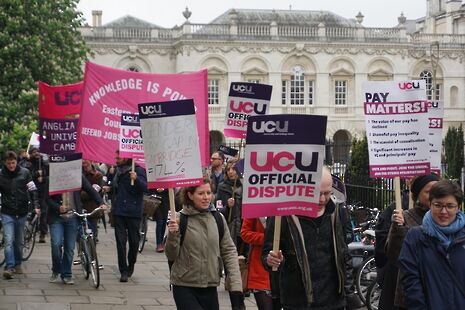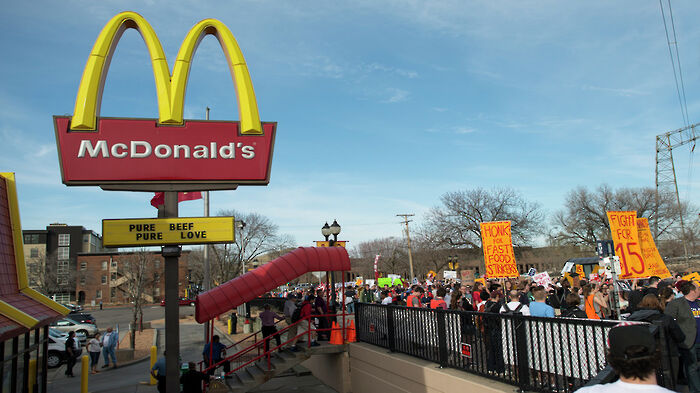Cambridge UCU calls for end to Cambridge’s ‘gig economy’ contracts and unfair pay
A report released earlier this month by the Cambridge branch of the University and College Union called upon the University to take action against employment casualisation

The Cambridge branch of the University and College Union (UCU) have released a report criticising the increased casualisation of employment at the University.
The report, entitled ‘Stamp out Casualisation in Cambridge’, draws attention to two key issues: the insecurity of those employed through the Temporary Employment Service (TES) and the lack of fair pay in hourly-paid teaching.
This report, released on 14 December, is the product of three surveys carried out by Cambridge UCU: a 2017 survey of 513 grad students, and two 2018 surveys of 108 Temporary Employment Service workers and 140 hourly-paid staff respectively. It also makes use of information obtained through Freedom of Information requests, and was produced with support from two other Cambridge University trade union branches: Unison and Unite.
“It feels like you’re a lower class of staff member”
The TES is a University of Cambridge service which aims to provide temporary workers for departments and institutions across the University and its colleges, including administrative staff, researchers and other support roles. According the to the Cambridge UCU report, the TES has employed 2573 staff at the University in the past three years.
TES workers are supposed to be temporary: according to the TES, they “typically provide cover for short-term staff absences, peak periods and temporary additional work”. However, Cambridge UCU argues that many contracts have not proven to be “genuinely” temporary, with 47% of respondents to their survey spending more than three months in a single workplace, and 26% working for over nine months on ‘temporary’ contracts.
The report highlights a number of problems with TES contracts: lower levels of legal protection and rights, a lack of opportunity for career progression and a negative impact on the quality of life and mental health for some respondents.
“It feels like you’re a lower class of staff member,” said one survey respondent.
The report argues that such problems with TES contracts are also an issue of equality: 65% of TES workers are women and 15% are BME, compared with a University-wide average of 51% and 12% respectively.
The report also draws attention to problems associated with hourly-paid teaching across Cambridge, which is carried out both by contracted and salaried members of staff, as well other types of worker who might have zero hours contracts or no contracts at all. Hourly-paid teaching includes not only supervisions, but seminars, lectures and laboratory demonstrations. Exam marking and undergraduate admissions are also commonly paid either by hour or by task.
“Universities depend on hourly-paid teaching but do not recognise the consequences for the people who have to pursue it”
Cambridge UCU criticised the “hidden underpayment” of hourly-paid staff, because wages often do not take into account hours spent preparing for their work, which can vary between subjects. In their 2017 survey of graduate students, supervisors for the Department of Politics and International Studies (POLIS), Music, Classics and Architecture required an average of 4 to 5 hours of preparation for each hour of supervision, whilst Engineering, Education and Psychology required an average of just 2 hours.
Of respondents to a 2018 survey, 56% of staff performing assessment and examination work and 39% of supervisors said that their effective hourly rate, taking into account preparation time, was less than the 2017/2018 Real Living Wage of £8.45. The Real Living Wage, calculated by the Living Wage Foundation, is higher than the National Living Wage, which is calculated by the UK government.
In Cambridge UCU’s 2017 survey of graduate students, 15% of respondents said that they were paid less than the National Living Wage for the actual hours they worked.
One survey respondent, quoted in the recent report, said: “Universities depend on hourly-paid teaching but do not recognise the consequences for the people who have to pursue it.”
Graduate Union President Sofia Ropek Hewson said: “Pay levels must be reviewed, in order to properly take into account time spent on preparation and marking. Most postgraduate students live on small stipends and they often depend on casual work to supplement their income.
“Work is often given to familiar faces, which benefits postgraduates who were Cambridge undergraduates, for example”
“In terms of the amount of teaching postgraduate students are given: some are given too many hours and some are given too few. In many departments and colleges, there aren’t transparent and fair systems in place to allocate work. Work is often given to familiar faces, which benefits postgraduates who were Cambridge undergraduates, for example.
She added that early results from the GU’s Mental Health Survey show that 46.37% of respondents, representing 836 postgraduates, “feel uncomfortable taking regular breaks or holidays, or aren’t permitted to take them”, which she described as “an indication of deeply problematic work cultures within the University.”
The report also criticised how college supervision rates have fallen behind inflation, with the average pay for university staff dropping in real terms by 11.8% (CPI) and 17.8% (RPI) since 2009, according to the Cambridge UCU branch.
The report said: “Cambridge is a wealthy university that proclaims its global impact and international excellence. Yet it relies on an army of insecurely employed and underpaid staff to deliver teaching, research, administrative and many other roles.”
“Casualisation does real harm to the quality of teaching that students receive and that academic staff are able to give”
Cambridge UCU called on the University of Cambridge to convene a joint working group, with both UCU and University representatives, to recommend actions in response to the issues highlighted in their report. They called for raises to wages for hourly-paid teaching, as well as the creation of a new policy regarding the appropriate use of TES contracts.
Responding to the concerns raised, a University spokesperson said: "The HR Division has been in discussion with Cambridge UCU regarding its national anti-casualisation campaign. A number of meetings have already taken place and we plan to continue those discussions next term, which will explore in more detail the issues raised in the report.”
CUSU Education Officer Matt Kite argued that “Casualisation does real harm to the quality of teaching that students receive and that academic staff are able to give.
“When teaching staff are not adequately paid for the time it takes to prepare for teaching and provide feedback, or where teaching is so badly paid that some staff are forced to take on an excessive workload, the impacts on the quality of teaching they are able to provide are obvious.”
The recent report forms part of a wider ongoing dispute between academics and the University regarding fair pay and insecurity in academia. Proposals to change universities’ pension schemes, which triggered industrial action across the country earlier this year, were seen to exacerbate the already precarious nature of a great amount of academic work.
In October, the Cambridge UCU and Unison branches wrote an open letter calling on Vice-chancellor Stephen Toope to support their campaign for better pay in the higher education sector. Their letter called for a pay increase of 7.5% for staff, arguing that “real terms pay has dropped more than 12% since 2009”. The Universities and Colleges Employers' Association University Council for Educational Administration (UCEA) had instead proposed just a 2% increase.
Later that month, Cambridge UCU, alongside UCU branches across the country, voted on whether to take industrial action on pay issues. The ballot saw a turnout of 48.1% – below the 50% threshold required legally for unions to initiate strikes – but a second vote will occur in January and February of next year.
 News / Cambridge academics stand out in King’s 2026 Honours List2 January 2026
News / Cambridge academics stand out in King’s 2026 Honours List2 January 2026 Interviews / You don’t need to peak at Cambridge, says Robin Harding31 December 2025
Interviews / You don’t need to peak at Cambridge, says Robin Harding31 December 2025 Comment / What happened to men at Cambridge?31 December 2025
Comment / What happened to men at Cambridge?31 December 2025 News / Varsity’s biggest stories of 202531 December 2025
News / Varsity’s biggest stories of 202531 December 2025 Features / “It’s a momentary expression of rage”: reforming democracy from Cambridge4 January 2026
Features / “It’s a momentary expression of rage”: reforming democracy from Cambridge4 January 2026










